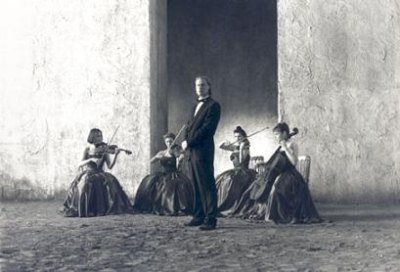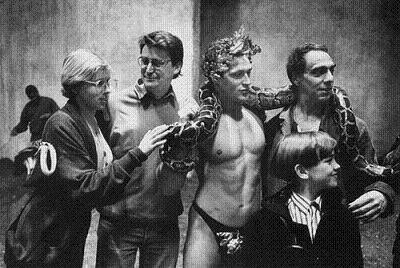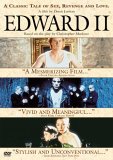| Reviews & Columns |
|
Reviews DVD TV on DVD Blu-ray 4K UHD International DVDs In Theaters Reviews by Studio Video Games Features Collector Series DVDs Easter Egg Database Interviews DVD Talk Radio Feature Articles Columns Anime Talk DVD Savant Horror DVDs The M.O.D. Squad Art House HD Talk Silent DVD
|
DVD Talk Forum |
|
|
| Resources |
|
DVD Price Search Customer Service #'s RCE Info Links |
|
Columns
|
|
|
Edward II
The Film:

Based on the play by Christopher Marlowe and directed by British director Derek Jarman Edward II (1991) is easily one of the most bizarre film adaptations ever made. A somewhat skewed attempt to partially, I suppose, retell the story of Edward II (Steven Waddington), his lover Gaveston (Andrew Tiernan), and Queen Isabella (Tilda Swinton) this minimalist production looks more like a theater play than an actual film.
As a result, it is difficult to say what strikes as more unusual here-the bold and often intentionally provocative tone of the film or Jarman's ultra-modernist approach to a piece of British history that is bound to spur some passionate debates with this adaptation.
Following Jarman's previous works such as The Tempest, Caravaggio, Sea of Storms, Jubilee, Aria, and The Last of England among others, Edward II is a curious mix of absurdity, poetry, and perhaps a bit of intellectual hedonism. All of the actors are closely following Marlowe's writings in contrast with the structure of the film which is often fractured by the lack of rhythm that a Shakespearian play would have. In addition, the period costumes and elaborate stage designs that one would expect from such a film are replaced by modern-day clothing and basic decors. Nevertheless, the manner in which the main characters speak resembles a Victorian piece that harshly contradicts the contemporary look of Edward II.
The vivid depiction of the homosexual affair between Edward II and Gaveston naturally takes a major part of this production. The yearnings of the two men are often strong and perhaps a tad too suggestive for the unsuspecting viewer. Yet the angry social critique that Jarman delivers certainly has much deeper political overtones. I assume that part of the semi-explicit and all too suggestive manner in which the story is filmed is indeed meant to shock and spur strong reactions, whatever they might be, disapproval, embarrassment, rage.
Before his tragic death in 1994, preceded by a long struggle with the AIDS epidemic, Jarman earned recognition for his gay-activism and a body of works that was hotly contested by both critics and fans. Judging by the extreme reactions Edward II has generated it is hard to deny the contentious gift Jarman possesses as a director. From the images of gay rights parades to the cameo performance of British pop diva Annie Lenox Edward II certainly aims to reach as far out as possible.
With all of its provocative mannerism and traditional poetry, however, Edward II proves to be a difficult film to analyze. At least if one attempts to do so following a well-familiar route where the director delivers a straightforward message or simply entertains its audience by using common film techniques. Edward II does not fit either of those two approaches.

There is too much anger, pretentiousness, and social criticism that define Edward II as more than a straightforward adaptation. There is Jarman's critique of our consumerist world and its social standards. Second, there is his disapproval of the social clichés we use toward homosexuality. Third, there is Jarman's angry protest against violence and its widespread acceptance in modern cultures. Fourth, there is the denial of traditional film techniques and the conventional expectations that they are associated with.
How Does the Disc Look? How Does the Disc Sound? Extras: Final Thoughts:
Serving as a political litmus test for Britain's acceptance of homosexuality and a harsh critic of Margaret Thatcher's conservative governments Edward II is much more than a literary adaptation. It is a cry for recognition. And even if you happen to disagree with the political connotations behind this film you would certainly find it an amusing experience, one worthy of an intelligent debate.
|
| Popular Reviews |
| Sponsored Links |
|
|
| Sponsored Links |
|
|
| Release List | Reviews | Shop | Newsletter | Forum | DVD Giveaways | Blu-Ray | Advertise |
|
Copyright 2024 DVDTalk.com All Rights Reserved. Legal Info, Privacy Policy, Terms of Use,
Manage Preferences,
Your Privacy Choices | |||||||














